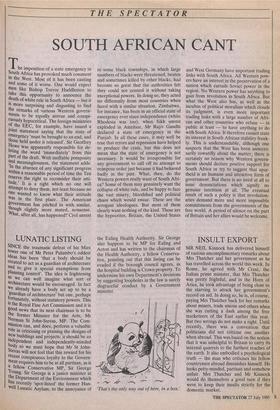THE SPECTATOR
SOUTH AFRICAN CANT
The imposition of a state emergency in South Africa has provoked much comment in the West. Most of it has been canting and some of it worse. One would expect men like Bishop Trevor Huddleston to take this opportunity to announce the death of white rule in South Africa — but it Is more surprising and disgusting to find the remarks of various Western govern- ments to be equally untrue and conspi- cuously hypocritical. The foreign ministries of the EEC, for example, have issued a Joint statement saying that the state of emergency 'must be brought to an end, and those held under it released'. Sir Geoffrey Howe was apparently responsible for de- leting the word 'immediately' from this Part of the draft. With ineffable pomposity and meaninglessness, the statement adds: In the absence of any significant progress Within a reasonable period of time the Ten reserve the right to reconsider their atti- tude.' It is a right which no one will attempt to deny them, not least because no one wanted to know what their attitude was in the first place. The American government has pitched in with similar, though slightly more muted, nonsense. What, after all, has happened? Civil unrest
in some black townships, in which large numbers of blacks were threatened, beaten and sometimes killed by other blacks, had become so great that the authorities felt they could not control it without taking exceptional powers. In doing so, they acted no differently from most countries when faced with a similar situation. Zimbabwe, for instance, has been in an official state of emergency ever since independence (white Rhodesia was too); when Sikh unrest exploded in Amritsar, Mr Rajiv Gandhi declared a state of emergency in the Punjab. In all these cases, it may well be true that errors and repression have helped to produce the crisis, but this does not mean that the state of emergency is not necessary. It would be irresponsible for any government to call off its attempt to reimpose order just because it had behaved badly in the past. What, then, do the Western powers really want of South Afri- ca? Some of them may genuinely want the collapse of white rule, and be happy to face the vast misery, bloodshed and political chaos which would ensue. These are the arrogant ideologues. But most of them clearly want nothing of the kind. These are the hypocrites. Britain, the United States and West Germany have important trading links with South Africa. All Western pow- ers have an interest in the preservation of a nation which curtails Soviet power in the region. No Western power has anything to gain from revolution in South Africa. But what the West also has, as well as the incubus of political moralism which clouds its judgment, is even more important trading links with a large number of Afri- can and other countries who refuse — in public at least — to have anything to do with South Africa. It therefore cannot state its interest in South African stability frank- ly. This is understandable, although one suspects that the West has been unneces- sarily cowardly about the matter; there is certainly no reason why Western govern- ments should declare positive support for South Africa or try to suggest that apar- theid is an humane and attractive form of government. But there is no need at all to issue denunciations which signify no genuine intention at all. The eventual result of such a policy is that revolution- aries demand more and more impossible commitments from the governments of the free world. A period of silence on the part of Britain and her allies would be welcome.














































 Previous page
Previous page